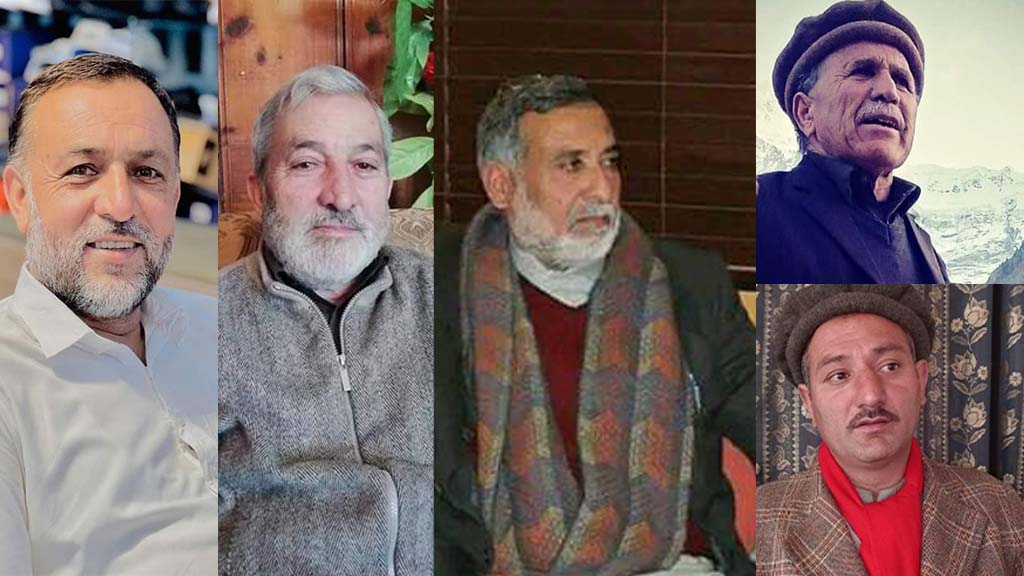- Web Desk
- Feb 24, 2026
Prominent activists from G-B placed on Schedule–IV
-

- Tanveer Abbas
- Jul 26, 2024

GILGIT: In a significant move, the Gilgit-Baltistan Home & Prisons Department has placed seven individuals, including prominent leaders of the Awami Action Committee (ACC), in the fourth schedule of the Anti-Terrorism Act, 1997.
According to an official notification issued by the department, the list includes ACC chairman and noted lawyer Advocate Ehsan Ali, Vice Chairmen Masoodur Rehman and Javed Naji, Spokesperson Kausar Hussain, and senior member Raja Nasir. Additionally, journalist Issa Khan Danish and Usman Ali Qureshi have also been included in the proscribed list. The notification indicated that this decision followed recommendations from regional intelligence committees of the Gilgit and Diamer-Astore divisions.
In a simultaneous move, the department has removed Maulana Farman Ahmed, Syed Hussain Shah Kazmi, and former minister Didar Ali from the said list. Consequently, the number of individuals placed under the fourth schedule from the region has increased to 31 from the previous 27.
According to the National Counter Terrorism Authority (NACTA), individuals can be proscribed under the Anti-Terrorism Act, of 1997, if there is credible intelligence information or a history linking them to a proscribed organization. Such individuals, once notified by the Home Department, face restrictions on travel, speech, and business. Locally, these proscribed persons are often referred to as “4th Schedulers.”
However, it is pertinent to note that the majority of individuals listed from Gilgit-Baltistan are political activists with no proven links to proscribed organizations.
The Awami Action Committee (AAC), formed in 2014, is an alliance of political and religious parties in Gilgit-Baltistan that addresses common socio-political issues and economic grievances, especially related to wheat prices. The committee is known for organizing protests, strikes, and rallies to advocate for the rights and demands of the people of Gilgit-Baltistan.
The inclusion of these activists in the fourth schedule has raised significant concerns about the freedom of expression and political activism in Gilgit-Baltistan. The decision has stirred considerable debate and concern among human rights activists and political observers.
Reacting to the development, Regional Coordinator of the Human Rights Commission of Pakistan, Israruddin Israr, criticized the decision saying, “Placing the leaders of the Awami Action Committee in Schedule-IV for raising their voices for political rights and public issues is a grave mistake by the government,” Israr said.
He said peaceful protest for political and public rights was a fundamental human right guaranteed not only by international human rights treaties but also by Article 16 of the Constitution of Pakistan and the Government of Gilgit-Baltistan Order 2018.
“Such actions against political and social figures result in nothing but infamy. It is imperative that the provincial government retracts this undemocratic decision and ensures the freedom of peaceful protests and other political activities by the Awami Action Committee,” he added.
Advocate Ehsan Ali, one of the prominent figures included in the list, expressed strong disapproval saying, “The decision to place the leadership under Schedule-IV using a colonial law like the Anti-Terrorism Act is intended to keep the Awami Action Committee and its central leadership under continuous pressure”.
However, he said, such authoritarian state actions would only bolster the resolve of the public leadership and increase the trust of the people of Gilgit-Baltistan in the Awami Action Committee.
“To prevent large corporations and companies from seizing the sources of livelihood of the people of Gilgit-Baltistan and to eliminate mega-corruption by the elite, the Awami Action Committee will continue its public resistance with even greater preparation and better strategy,” he added.
“The movement will intensify to secure the fundamental human right for the people to decide their own fate, ensuring their access to basic necessities such as employment, electricity, quality free education, healthcare, clean water, and high-speed internet services,” Ehsan concluded.




